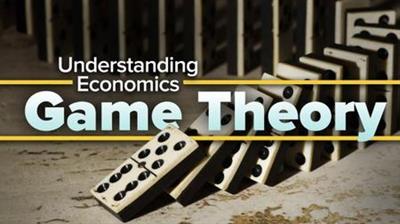TTC Video - Understanding Economics: Game Theory
.MP4, AVC, 1280x720, 30 fps | English, AAC, 2 Ch | 5h 40m | 4.77 GB
Lecturer: Jay R. Corrigan, PhD Professor, Kenyon College | Course No. 50000
Imagine you are a criminal being interrogated by the police. In the next room, your accomplice is being questioned separately. While both of you would be better off keeping your mouths shut, the worst outcome is if you stay silent and your confederate confesses, implicating you and getting a lighter sentence as a reward-so that would actually mean a better outcome for you if you confess and they stay quiet. Game theory predicts that both of you will therefore confess, earning an intermediate level of punishment but forgoing the lesser penalty you both could have had if you had said nothing.
Strategic predicaments like this "prisoner's dilemma" operate in practically every sphere of life but especially in economics, where competition, price, profit, the quest for market power, and other factors make the marketplace an endlessly interesting arena for game theory.
Understanding Economics: Game Theory introduces you to the fundamentals of this fascinating subject through the lens of economics in 12 entertaining half-hour lessons taught by Professor of Economics Jay R. Corrigan of Kenyon College. Named one of America's best college professors by The Princeton Review, Dr. Corrigan uses minimal math and maximal ingenuity, combined with insightful graphics, to illuminate scenarios such as:
Swine Strategy: The fight for food between a big pig and a little pig reveals a Nobel Prize-winning concept in game theory. Devised by John F. Nash, the Nash equilibrium explains why the little pig should wait by the food trough while the big pig pushes the food-dispensing lever, which is located across the pen. The big pig then has to trot to the trough and nudge the little pig out of the way, but it is both animals' best strategy.
Ultimatum Game: Human psychology complicates game theory in the ultimatum game, in which two players interact anonymously. One proposes to divide a sum of money. The other either accepts the split or declines, in which case no one gets anything. In theory, the second player should accept any division, since something is better than nothing. But people often ignore this reasoning over fairness issues.
Going, Going, Gone!: Auctions offer efficiency to both buyers and sellers. Professor Corrigan examines four basic types of auctions and the most effective strategies for each. One notorious pitfall is the "winner's curse," common in auctions where the value of the asset being sold is the same for everyone, but is unknown-for example, the acquisition of mineral rights. The winner typically overpays and risks financial ruin.
Professor Corrigan notes that in his economics classes, he makes the winner's curse viscerally clear by having his students bid on a jar filled with coins. Inevitably, the winner is a student who overestimates the value of the contents-just as in real-world auctions for common-value goods. In these cases, learning that you are the winner can be bad news!
Learn the Principles of Game Theory
Two key ideas of game theory are the dominant strategy and the Nash equilibrium. You have a dominant strategy if one course of action is best for you, no matter what the other player does. In the prisoner's dilemma, it's confessing. The Nash equilibrium is reached if no player has an incentive to change his or her strategy unilaterally, which is the case in prisoner's dilemma when both sides confess. In Understanding Economics: Game Theory, you learn how to spot these key ideas, along with other fundamental features of games.
You also learn how to diagram a game with a payoff matrix, which is a table that shows every player's payoff based on the strategies each player selects. And you practice backward induction, where you start at the game's last round and work your way back to the beginning to determine your best opening move. These are powerful tools for seeing the game from opposing points of view and uncovering an optimum strategy for yourself.
Professor Corrigan analyzes real-life examples of game theory in practice so you can understand how these principles work and how they would be applied in the world, using case histories to explain them, such as:
College Collusion: Over the course of three decades, 57 elite US colleges conspired to fix tuition and financial aid awards, preserving their budgets while shortchanging students and parents. The cartel lasted so long because the schools were effectively playing an infinitely repeated prisoner's dilemma game, in which it was in their interests to cooperate-until the Justice Department intervened.
Choose Your Weapon: In an era before credit scores, dueling may have served the function of establishing creditworthiness. This was a high-stakes solution to the problem of asymmetric information in lending. If you valued your reputation for honesty enough to issue or accept a challenge to duel, then you were considered a good credit risk-although perhaps not a good risk for life insurance.
Mixing It Up: It pays to be unpredictable in games where you don't want your opponent to guess your strategy. This is called a mixed strategy, as opposed to a pure strategy where you always choose the same game plan. An example is a store's deep-discount sales, which should be unpredictable so customers don't put off their purchases. Exceptions like seasonal Black Friday sales generally don't give the best bargains.
Games Are Everywhere!
While economics is the focus of this course, Professor Corrigan's examples come from a wide range of activities, since game-like behavior is a universal element found in society. And not just among people; animals also follow the principles of game theory, not because they understand it, but because evolution has, in effect, played the world's longest game in achieving equilibria among different species. This natural phenomena is similar to the game of "chicken," in which two teenagers drive straight at one another until one-the chicken-veers away. Animals also engage in this "toughness" contest.
Understanding Economics: Game Theory will prime you to start seeing games everywhere-in business, at work, in the news, even at home. Professor Corrigan's lessons will get you thinking: Who are the players? What are their strategies? What are the payoffs? What is the equilibrium? And you will notice how many games you play without realizing it-from negotiating the purchase of a car to deciding whether to accept an airline's offer of a voucher to give up your seat on an oversold flight. Best of all, it will give you the confidence to weigh your options, size up the competition, and choose a sound plan of action.
Download link:Kod:rapidgator_net: https://rapidgator.net/file/eb11c33248b01e79d8e0ec173093002c/n1sh0.TTC.Video..Understanding.Economics.Game.Theory.part1.rar.html https://rapidgator.net/file/44279e919944aae84376ded81c98e324/n1sh0.TTC.Video..Understanding.Economics.Game.Theory.part2.rar.html https://rapidgator.net/file/609fe555d78adeec5d730026371f1da2/n1sh0.TTC.Video..Understanding.Economics.Game.Theory.part3.rar.html https://rapidgator.net/file/414bda6a1d152bd609c3932b74cc053f/n1sh0.TTC.Video..Understanding.Economics.Game.Theory.part4.rar.html https://rapidgator.net/file/3adc43c1332bc75e869febbe1c3782b5/n1sh0.TTC.Video..Understanding.Economics.Game.Theory.part5.rar.html nitroflare_com: https://nitroflare.com/view/03B988EBAB2B7C8/n1sh0.TTC.Video..Understanding.Economics.Game.Theory.part1.rar https://nitroflare.com/view/43241063454DFDD/n1sh0.TTC.Video..Understanding.Economics.Game.Theory.part2.rar https://nitroflare.com/view/46F66DBFDBA7719/n1sh0.TTC.Video..Understanding.Economics.Game.Theory.part3.rar https://nitroflare.com/view/B3F1CBC335D7926/n1sh0.TTC.Video..Understanding.Economics.Game.Theory.part4.rar https://nitroflare.com/view/AA16FF2630BFDF8/n1sh0.TTC.Video..Understanding.Economics.Game.Theory.part5.rarLinks are Interchangeable - No Password - Single Extraction
1 sonuçtan 1 ile 1 arası
-
13.03.2021 #1Üye



- Üyelik tarihi
- 20.08.2016
- Mesajlar
- 144.971
- Konular
- 0
- Bölümü
- Bilgisayar
- Cinsiyet
- Kadın
- Tecrübe Puanı
- 153
TTC Video - Understanding Economics: Game Theory
Konu Bilgileri
Users Browsing this Thread
Şu an 1 kullanıcı var. (0 üye ve 1 konuk)



 LinkBack URL
LinkBack URL About LinkBacks
About LinkBacks






 Alıntı
Alıntı
Konuyu Favori Sayfanıza Ekleyin